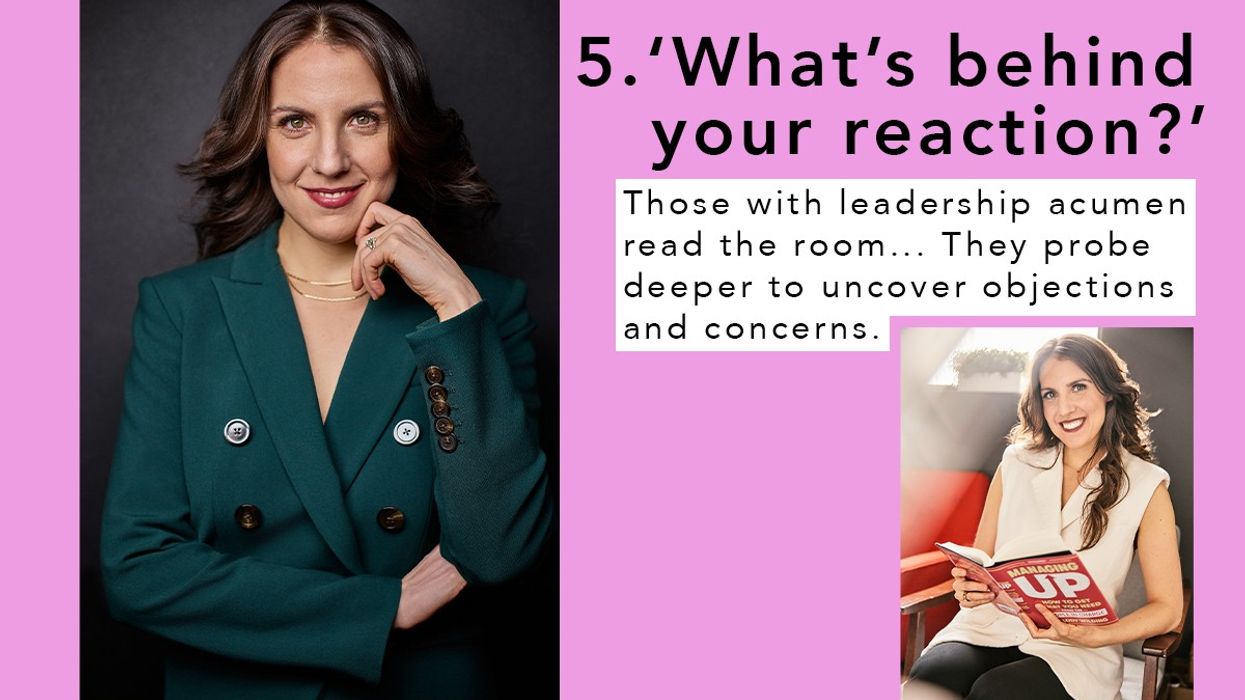Not everyone has been gifted the ability to read a room and then act accordingly. Some of us need to really work at it. Leadership skills are a practice that Melody Wildling has been coaching the smartest, top performers at the world's most successful companies for over a decade. She recently shared the 5 simple phrases that will help give you authority in conversations at work. But, this well-established author's techniques can also help your outside relationships, too.
In her latest novel "Managing UP," she talks about the best ways to gain position and status at work. Status that's acquired even when you don't hold a position of authority. There are necessary tools to gain respect and recognition where it's missing. The rewards come with implementing real-world tactics that help you gain influence and a competitive edge.

'Our options are A, B, and C. My recommendation is...'

Melody writes, "Instead of communicating in long, flowing explanations, use structure to present possible solutions and make a clear recommendation." The premise being overly formal and dense communication can be quite difficult to follow and engage. People will find themselves confused and be bored.
Connection can be intensified through simplifying and structuring your ideas. A study in 2025 published by Cornell University found that being precise and clear had more value than winding, technical explanations. A strategy of less narrative fluff doesn't mean less authority, it means greater impact.
'Here's what I'm seeing...'

Melody writes, "In an effort to sound humble, you might preface your ideas with tentative phrases..." She continues, "Even if you don't know the answer or feel caught off guard, focus on what you do know. This builds trust in your professional judgment."
It's impossible to know all the answers all the time. But, just because you may be missing some information in a conversation, doesn't mean you don't have anything to add. An article in verywellmind on the best ways to say 'I don't know' shared a great response could also be, "I didn't think about that in the way you've framed it, but it's a great question." This technique can suggest you have a different perspective, but also that you recognize the other person's perspective too.
'Which means...'

"The disconnect typically comes down to emphasizing activities instead of outcomes..." said Melody. "... you're describing what you did, but not why it matters to the business. Instead, highlight the end results of your efforts." This concept is very much about not just saying what you're talking about, but why it actually matters.
It has real world relevance in that learning how to frame our communication can establish stronger empathy and connection. A 2024 study on empathy in the National Library of Medicine found framing our actions around relational outcomes, "I heard what you said and adjusted based on how you are feeling," shows empathy in a meaningful way. It builds stronger relationships and demonstrates respect to be given and received.
'What we need next is...'

"The most effective communicators I've coached have mastered the art of making clear calls to action," Melody explains. "Be specific about the action you'd like the person to take." The clean and simple, don't end messages vaguely. You're putting the burden on other people to figure out what your asking.
This concept flows neatly into our daily interactions with other people. Being clear about what we expect when it comes to plans, emotional needs, or even asking for help. A study in 2023, published in the Journal of Social Psychology found people who communicate their needs and feelings clearly are more likely to have greater relationship satisfaction. This behavior signals confidence and others will take notice.
'What's behind your reaction?'

Melody states, "Those with leadership acumen read the room. They don't ignore or push harder when a C-level executive seems hesitant. They probe deeper to uncover objections and concerns." Being able to recognize body cues, tone, hesitation is critical for good leadership. The ability to pause and observe, great leaders want to really understand what's happening.
Just like in a meeting environment, friends, family, basic relationships, people don't necessarily openly share their fears or hesitations. Being present and able to sense something is off and gently ask questions about it is definitely 'boss' behavior. An article Can Asking Specific Questions Deepen Any Relationship? from 2023 in Psychology Today states, "Opportunities abound in conversation to follow up and ask people about their personal experiences, and to listen and respond with care. It takes time, trial and error, and digging deeper at a shared speed and around topics that work for you and the person you are connecting with."
Melody Wilding has offered up fantastic phrasing. Words that strongly indicate a well established position that will hold value in any environment. But, the thoughts, meanings, and feelings behind these words are what grab people's attention. Being a strong conversationalist requires listening and responding. Blind leaderships fails. Strong relationships require intuitive, open, honest communication. It's what great relationships are all about.



















 Elegance in red.Photo credit:
Elegance in red.Photo credit:  An older woman shows off some bling.Photo credit:
An older woman shows off some bling.Photo credit:  A woman enjoys a beautiful day. Photo credit:
A woman enjoys a beautiful day. Photo credit: 

 Thinking.
Thinking.  Observe your thoughts.Photo credit
Observe your thoughts.Photo credit  Reading a book and reflecting under a tree.Photo credit
Reading a book and reflecting under a tree.Photo credit 


